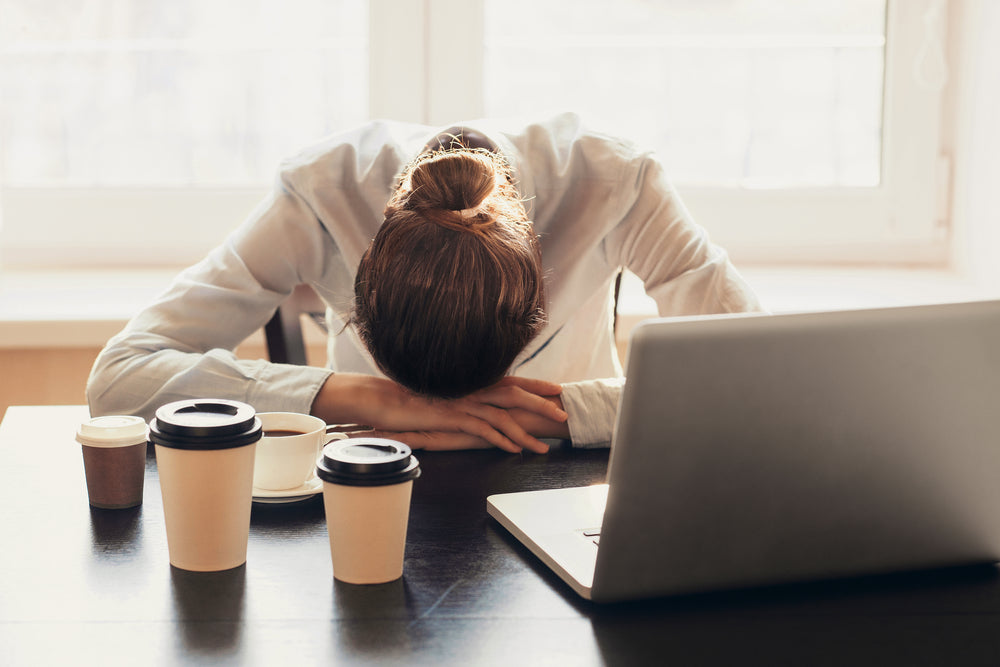After getting a bad night of sleep, it’s not uncommon to reach for that first (and second) cup of coffee. We rely on caffeine to get us through early morning, late nights, and even stressful afternoons. Our allegiance to the almighty latte usually comes from desperation––we’re trying to get a pick me up to get us through the day. And it can help, sometimes.
If you suffer from one bad night of sleep, caffeine can give you the oomph you need to get through your day. However, if you suffer from chronic sleep deprivation or fatigue, even over just a few days, then caffeine will not help you the way you think it will. If you suffer from excessive daytime fatigue, it’s important to try and explore all avenues for better sleep before you turn to caffeine too much.
Your Coffee is Letting You Down
We assume that caffeine always works the same way, but that is not actually the case. In a double-blind research study (neither testers nor participants knew who was getting a placebo), researchers tracked 48 people who only got 5 hours of sleep per night for five consecutive days. At two points during the day, participants would either get a placebo or a 200 mg caffeine pill––roughly equivalent to a large cup of coffee.
After three nights, the performance and alertness of all participants fell whether they got the caffeine boost or not. Ultimately, the study found that a daily dose of caffeine is not enough to make up for a bad night of sleep. While it may be effective once in a while, it is not the answer for someone who is suffering from sustained sleep deprivation. In fact, the study found that, after sustained lack of sleep, all the caffeine pills seemed to increase were participants’ levels of irritability.
Downsides to Caffeine Dependence
There are a lot of reasons why depending on caffeine for your daily energy is bad, but there are a few that may be extra worrisome. First, one cup of coffee may not seem like enough, so it’s not uncommon to have more than one. But be careful, because consuming more than 4 cups of coffee a day has been linked to an early death. In a study by the Mayo Clinic, men who drank more than four 8 oz. cups of coffee per day had a 21% uptick in “all-cause” mortality.
Second, caffeine consumption can raise your blood pressure––this is especially true if you already have hypertension without any caffeine intake. In another study by the Mayo Clinic, those who already had hypertension would see an elevated blood pressure for two to three hours after consuming caffeine. An increase in your blood pressure can also put you at an increased risk for heart attacks, even in young adults.
Lastly, caffeine can be problematic for those who suffer from Type II Diabetes. In a study led by the American Diabetes Association, researchers found that caffeine consumption impaired glucose metabolism in Type II diabetics. Especially if you suffer from any of these conditions already, it’s important to monitor caffeine consumption to ensure long term health.
Why Are You Sleep Deprived?
Whether or not you use caffeine as a regular pick-me-up, it’s important to get good sleep on a nightly basis. Sleep is one of the most essential parts of long-term health, and, if you’re getting poor sleep that leads to chronic fatigue, you need to figure out why as soon as possible. Regular daytime fatigue is one of the most common symptoms of Obstructive Sleep Apnea, or OSA.
OSA is a condition where the body blocks the airways during sleep. These blockages cause choking during sleep and cause the body to wake up, impeding the normal sleep cycle. While this may not seem so problematic, OSA can lead to serious health concerns if left untreated. Not only will you suffer from irritability, mood swings, brain fog, memory problems, and daytime fatigue, you can also develop serious conditions like heart disease, heart attacks, stroke, Type II diabetes, and even certain types of cancer.
If you believe you may be suffering from OSA, it’s important to get tested as soon as possible. There are two basic types of sleep testing: in-laboratory and at-home testing. Lab testing is more expensive and uncomfortable than home testing, so if you’re looking for answers quicker without the runaround, home testing would be the best option for you.
Before you try to find the biggest cup of coffee available, try to figure out what is causing your sleepiness in the first place. If you tossed and turned for one night, then you’re more than likely okay to grab that early morning cup of joe. But, if chronic fatigue has become a staple of your day-to-day life, you need better answers than a cappuccino with an extra shot. Enjoy your caffeine, but be sure to enjoy it responsibly.

